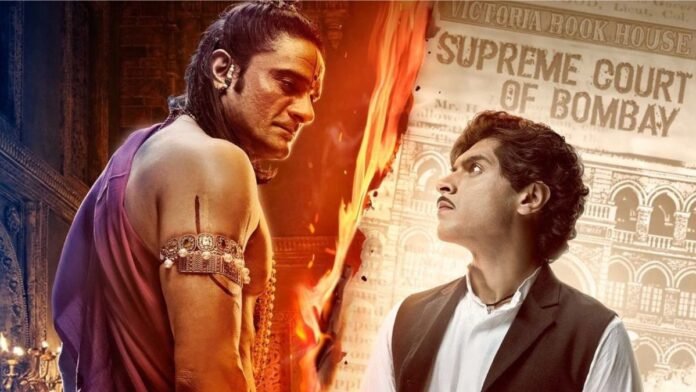Without the sensitive climate of today, Maharaj might easily slip under the radar.
Film can provide us with the rare privilege of showing the lives and journeys of its subjects. Karsandas Mulji was dragged before the court for writing articles criticizing powerful godmen. Over 150 years later, Maharaj, a Netflix film depicting Karsandas’ life and featuring Aamir Khan’s son Junaid in his first role — was temporarily blocked due to petitions filed by members of a religious sect (accompanied by calls for its boycott on social media). On June 21, when it lifted its stay one week before the premiere on Netflix, the Gujarat High Court judged “Having seen the film, this court found nothing objectionable that might offend their religious sensibilities or cause offense within their sect.”
An incredible feat for any movie: accurately reflecting the fate of its subject matter. Karsandas Mulji was an 18th-century journalist and social reformer dragged before the court over an article that exposed sexual misconduct at an influential godman’s courthouse. Over 150 years later, Maharaj — a Netflix movie about Karsandas’ life featuring Aamir Khan’s son Junaid in his debut role — had its release temporarily delayed after petitions by members of a religious sect were filed (accompanied by calls to boycott it on social media). On June 21, lifting its stay for viewing of Maharaj, Gujarat High Court judge found nothing objectionable that would cause offense or hurt religious feelings, ruling: Having seen it, no offending content can be found which might violate religious sentiments of petitioners or sect members.” On June 21, it lifted its stay by ruling:
Malhotra made an unusual decision by saving courtroom action until near the conclusion of his film, likely as an effort to avoid comical wigs and exaggerated accents that are so prevalent in Hindi period dramas. Instead, much of the movie consists of an extended battle between Karsandas (Junaid) and Jadunath (Jaideep Ahlawat), known by fans as JJ. JJ, an alluringly charismatic figure, casts an irresistible spell over his flock. Preying upon female devotees’ vulnerabilities and indoctrination by preying upon the faith itself while exploiting them sexually. Everyone appears under JJ’s spell; only Karsandas seems immune, having grown up questioning the superstitions — yet not faith itself — of his orthodox sect.
Karsandas stands out as an embodiment of virtue in his introduction scenes, advocating for widow remarriage while graciously taking some chutney from an “untouchable”. Karsan (Shalini Pandey), Karsan’s fiancee who took her life after Karsan broke off their engagement, becomes his prime motivation to rebel against JJ and expose his sexual liaisons in front of everyone. Kishori (Shalini Pandey), one of JJ’s many victims, commits suicide after Karsan breaks off their engagement and displeases her by breaking it off abruptly. He soon comes to realize his mistake of becoming preoccupied with protecting JJ’s honor at the expense of her emancipation. Karsan comes across as a 19th-century male savior; much of the film is dedicated to men arguing about women’s rights; however, Viraaj (Sharvari Wagh), joins Karsan in his battle against JJ.
Malhotra and his writers offer us an intimate insight into India at that time, with conflicting ideals aplenty: from modernizing reformers like Karsandas and Dadabhai Naoroji’s modernizing ideology; religious chieftains like JJ’s intimidating presence and wealth; to confusion amongst common masses. While much of the production design may resemble sets – much like another YRF production set in modern Gujarat: Jayeshbhai Jordaar — there is also something magical about Rajeev Ravi’s cinematography which creates a painterly quality that charms.
The film shows us with clear clarity what a terrifying hold JJ had over his community: we learn that he’d become “the face of his sect,” drawing wealthy patrons onto his initiative and consolidating power through personal charismatic means. Yet simultaneously, religion plays an integral role in unifying images from religion itself: when JJ institutes an embargo on temple visits (to coerce an apology from Karsandas), one young man responded by installing an image of Lord Krishna under a peepal tree and leading an aarti service with all his fellow believers; later still, there was an emotional paralleling to Janmashtami when an imperiled pregnant couple were brought off via bullock cart at midnight!
Junaid Khan is as sincere and charismatic as the striving Karsandas; his jawline recalls Rami Malek — though far from becoming an engaging leading man: particularly dull are his courtroom scenes. Jaideep Ahlawat makes a seamless impression as the villain; you might catch him stifling a smile now and again given how ordinary Karsandas is as an opponent; during their 1970s-style confrontation in the rain Ahlawat raises his voice just once to demonstrate the disparity in performance between their performances; Sharvari Wagh gives her limited scenes charm and spunk while Jay Upadhyay (Scam 1992) makes an impactful and delightful cameo appearance as his conniving factotum.
Last year, Annapoorani was removed from Netflix due to right-wing trolling and claims of hurting religious sentiments. Maharaj would likely slip under the radar without current sensibilities being so touchy; yet Netflix released this film with no promotions or trailer, further underscoring their level of caution with streaming platforms currently observing. Maharaj is an odd example: its message may seem straightforward enough but progress rarely moves in an upward trajectory.
Maharaj is now available on Netflix.



